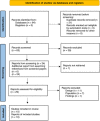Perspectives of women living with type 1 diabetes regarding preconception and antenatal care: A qualitative evidence synthesis
- PMID: 37909855
- PMCID: PMC10726142
- DOI: 10.1111/hex.13876
Perspectives of women living with type 1 diabetes regarding preconception and antenatal care: A qualitative evidence synthesis
Abstract
Introduction: Pregnant women with type 1 diabetes may have an increased risk of complications for both the baby and themselves. Educational programmes, preconception planning, strict glycemic control and comprehensive medical care are some of the antenatal interventions that have been proposed to improve the outcomes of pregnant women with type 1 diabetes. While some evidence-based recommendations about antenatal care are included in clinical practice guidelines (CPGs), the views, and experiences of women with type 1 diabetes about these interventions are not well known.
Aim: To understand and synthesize the perceptions of women with type 1 diabetes about the interventions before pregnancy.
Method: A qualitative evidence synthesis (QES) was carried out with a framework analysis guided by the Cochrane Qualitative and Implementation Methods Group approach. Three online databases (Medline, Embase and Web of Science) were searched. We included qualitative articles that were published from 2011 to 2021 and which were available in English or Spanish.
Findings: Ten references met the inclusion criteria of the study and were included. Three main themes were identified: (a) acceptability of antenatal care, (b) feasibility and implementation consideration and (c) equity and accessibility difficulties.
Conclusion: Continuity of care, coordination between health professionals and services, and a more holistic approach are the key aspects women say need to be considered for more acceptable, feasible and equitable preconception and antenatal care.
Patient or public contribution: This QES was carried out as part of the CPGs on diabetes mellitus type 1, carried out as part of the Spanish Network of Health Technology Assessment Agencies. In this CPG, the representatives of the patient associations are Francisco Javier Darias Yanes, from the Association for Diabetes of Tenerife, who has participated in all the phases of the CPG; Aureliano Ruiz Salmón and Julián Antonio González Hernández (representatives of the Spanish Diabetes Federation (FEDE) who have participated as collaborator and external reviewer, respectively.
Keywords: preconception care; pregnancy; qualitative evidence synthesis; type 1 diabetes.
© 2023 The Authors. Health Expectations published by John Wiley & Sons Ltd.
Conflict of interest statement
The authors declare no conflict of interest.
Figures
References
Publication types
MeSH terms
Grants and funding
LinkOut - more resources
Full Text Sources
Medical
Miscellaneous


